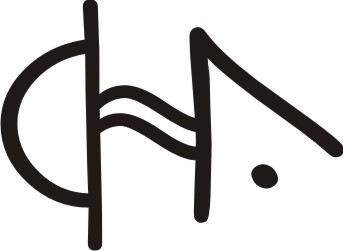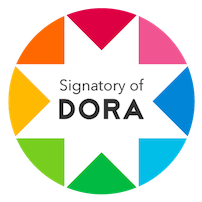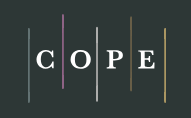About the Journal
EVALUATION, CODE OF ETHICS AND GOOD PRACTICES
The IHA will acknowledge receipt of the originals, with an estimated evaluation time of 120 days, which will be submitted for evaluation. One of three conditions will be communicated to the author: acceptance, acceptance with objection, or rejection. The publications accepted with objection the authors will have fifteen days for the corresponding rectifications. Communications that do not comply with these rules will not be published.
Peer review process
The works presented (both the Free Articles and the Dossiers) will be submitted to two instances of evaluation, an internal evaluation by the Editorial Committee of the Institute of Art History and an external evaluation by peers (double blind).
internal evaluation
It is in charge of the Editorial Committee of the Institute of Art History that knows the identity of the author and vice versa. Said Editorial Committee will determine if the content received responds to the formal norms and if it is adapted to the thematic lines of the CHA. At first, the author will be informed if the theme corresponds to the interests of the Art History Notebooks, and from that moment any change may be suggested before starting with the external evaluation. Once it has been established that the publication proposal meets the formal and thematic requirements, the external evaluation stage will begin. The acceptance or rejection of a work for its publication rests with the Editorial Committee, which must be based for this on the reports received on the quality of the works. In addition, the Editorial Committee may reject works received without resorting to an external consultation process, if it considers them inadmissible due to lack of adaptation to the technical and/or scientific requirements of the CHA, or for presenting evidence of plagiarism or self-plagiarism.
External evaluation
The mechanism implemented will be the double-blind system, where the authors do not know the identity of the evaluators, and the evaluators do not know the identity of the Authors. The article will be sent to a minimum of two evaluators, who, through the Guide for evaluators, will issue a report by completing the Evaluation Form. At the beginning of the evaluation, it will be taken into account that the reviewers do not belong to the University or Institution to which the author belongs. In case of contradictory evaluations, a third opinion will be requested.
Evaluation criteria:
Originality: The works must be original and cannot be presented simultaneously in other magazines, or in other publications.
Presentation: conceptual and expressive clarity. Respect for the guidelines for authors.
Scholarship: consideration of other relevant research.
Evidence: confidence in the methodology, data and analysis.
Reasoning: arguments, inferences and solid theoretical interpretations.
Theory: sufficient solvency and supported by verifiable evidence.
Extension: adequate.
Ethics: licenses, authorizations, approvals and permits necessary for the works to be published, following the publication regulations of the CHA.
The end of a scientific journal in the digital environment was born with the aim of generating a space for dialogue between scientists.
CODE OF ETHICS AND GOOD PRACTICES
Our publications adhere to the standards of Scientific Ethics expressed in the Manual of Editorial Management of Scientific Journals of Social and Human Sciences (p. 119) of the Ministry of Science, Technology and Productive Innovation of the Presidency of the Nation of the Argentine Republic. In addition, the CHA, mainly adhere to DORA, since they refer to good practices and ethics as the set of rules that deal with good or bad human actions, in relation to respect between people and not concerning the legal order.
Fraud and other wrong behavior
Arbitration is not a system that allows the detection of fraud. The referees are reasonably prepared to detect plagiarism or falsifications since they are experts in the subject area they evaluate.
CHAs consider undesirable behaviors to:
Fraud: deliberate deception, which may include the fabrication of data.
Falsification: or modification of data is considered a violation of research ethics. Falsifying is manipulating research materials, equipment or the different processes involved in it, as well as changing or omitting data or results. The use of third-party data requires the prior authorization of its author.
Piracy: when the ideas of others are illegally copied and used.
Research Misconduct
Measures will be taken to identify and prevent the publication of articles in which some type of misconduct has occurred, such as plagiarism, or the manipulation of citations, among others. CHAs will not promote misconduct and no misconduct of any kind will be permitted. In this case, the CHAs follow the COPE guidelines.
Source acknowledgment
The appropriate recognition of the scientific production of other authors should always be respected. The authors must cite the publications that have influenced the determination of the nature of the submitted work.
Plagiarism: According to the Royal Spanish Academy Plagiarism, is the act of copying someone else's work maliciously attributing authorship. Therefore, it is copying ideas, texts or data without mentioning the Author. Plagiarism implies non-originality and understands as original that scientific, artistic production, which is the product of the author's creation.
Plagiarism will be considered when: there is an omission of authorship (voluntary or involuntary) and what has been taken from another text is not indicated in the text with quotation marks.
By paraphrase we understand when few changes occur in a text that is not your own. Other types of plagiarism will be pointed out when in a citation the author's references have been indicated inaccurately both in the editorial references and in the pages. Plagiarism will also be considered the lack of quotation marks in terms or phrases of a text that is reproduced verbatim.
CODE OF ETHICS AND GOOD PRACTICES
Our publications adhere to the standards of Scientific Ethics expressed in the Manual of Editorial Management of Scientific Journals of Social and Human Sciences (p. 119) of the Ministry of Science, Technology and Productive Innovation of the Presidency of the Nation of the Argentine Republic. In addition, the CHA, mainly adhere to DORA, since they refer to good practices and ethics as the set of rules that deal with good or bad human actions, in relation to respect between people and not concerning the legal order.
Fraud and other wrong behavior
Arbitration is not a system that allows the detection of fraud. The referees are reasonably prepared to detect plagiarism or falsifications since they are experts in the subject area they evaluate.
CHAs consider undesirable behaviors to:
Fraud: deliberate deception, which may include the fabrication of data.
Falsification: or modification of data is considered a violation of research ethics. Falsifying is manipulating research materials, equipment or the different processes involved in it, as well as changing or omitting data or results. The use of third-party data requires the prior authorization of its author.
Piracy: when the ideas of others are illegally copied and used.
Research Misconduct
Measures will be taken to identify and prevent the publication of articles in which some type of misconduct has occurred, such as plagiarism, or the manipulation of citations, among others. CHAs will not promote misconduct and no misconduct of any kind will be permitted. In this case, the CHAs follow the COPE guidelines.
Source acknowledgment
The appropriate recognition of the scientific production of other authors should always be respected. The authors must cite the publications that have influenced the determination of the nature of the submitted work.
Plagiarism: According to the Royal Spanish Academy Plagiarism, is the act of copying someone else's work maliciously attributing authorship. Therefore, it is copying ideas, texts or data without mentioning the Author. Plagiarism implies non-originality and understands as original that scientific, artistic production, which is the product of the author's creation.
Plagiarism will be considered when: there is an omission of authorship (voluntary or involuntary) and what has been taken from another text is not indicated in the text with quotation marks.
By paraphrase we understand when few changes occur in a text that is not your own. Other types of plagiarism will be pointed out when in a citation the author's references have been indicated inaccurately both in the editorial references and in the pages. Plagiarism will also be considered the lack of quotation marks in terms or phrases of a text that is reproduced verbatim.
We adhere to international guidelines through COPE, A4 landscape version, taking into account the Committee on Publication Ethics. Through organizations such as the Council of Science Editors from its CSE White Paper on Promoting Integrity in Scientific Journal Publishing, in addition to the White Paper on Publication Ethics, and Expressions of Gratitude. Among other guidelines we consider How to Avoid Plagiarism, Self-Plagiarism, and Other Questionable Writing Practices: A Guide to Ethical Writing at: ORI, The Office of Research Integrity – ORI – US Department of Health and Human Services – Office of Research Integrity. In addition, the CHAs adhere to the policies of Open Access Journals (DOAJ, https://doaj.org) whose mission is: to organize, maintain and develop a reliable source of information on open access academic journals on the web; to increase the visibility, dissemination and support of the scholarly communication system.
The CHAs use computer tools provided by Google and Google Scholar.
PUBLICATION POLICIES AND PROCESS
open access policy
This journal provides immediate open access to its content, based on the principle that making research available to the public supports a greater global exchange of knowledge. The sending, evaluation and publication of the works in the journal have no cost for the authors.
The articles sent to the Editorial Committee of the Institute of Art History, to be published, the authors reserve their property rights, but grant the Editorial the printing rights and accept the dissemination both on paper, on the Internet and on those virtual sites. of which the CHA are part.
Respect and right to privacy of people participating in an investigation
The right of people should not be infringed without informed consent. Information that serves to identify a person several people in the form of photos, or description, or genealogy, may not be published, unless the express consent of the person is obtained.
FOCUS AND SCOPE
Cuadernos de Historia del Arte is an open access digital scientific journal, licensed under a Creative Commons Attribution-NonCommercial-ShareAlike 3.0 Non-cover License with peer review and a biannual periodicity (2 issues per year, January-June and July-December) of the Institute of History of Art of the Faculty of Philosophy and Letters of the National University of Cuyo.
FOCUS AND SCOPE
Cuadernos de Historia del Arte is an open access digital scientific journal, licensed under a Creative Commons Attribution-NonCommercial-ShareAlike 3.0 Non-cover License with peer review and a biannual periodicity (2 issues per year, January-June and July-December) of the Institute of History of Art of the Faculty of Philosophy and Letters of the National University of Cuyo.
Its call is open all year. The CHA publish unpublished and original works, in Spanish, Portuguese, French and English, on the history of art and regional, national and international culture, with special emphasis on the problems and tensions proposed by the approaches to Latin American and Hispanic American art. . The themes they contain address the relationships between artistic production and the various cultural, social, political and economic contexts. It is a publication that is open to different disciplines that address art and culture as an object of study from critical theoretical and methodological perspectives that foster an enriching debate in the scientific field.
CATALOGING, INDEXING and EDITORIAL QUALITY
cataloging data
Title: Art History Notebooks
ISSN: ISSN: 0070-1688 (printed - 1961)
ISSN-L: 0070-1688
ISSN: 218-5555 (online - 2017)
Periodicity: biannual (two numbers a year). First semester (February-June) and second semester (July-November). The reception of works is open all year round. The edition corresponding to the first semester of each year (February-June) includes, in addition to free articles, the Dossier section, in charge of an associate editor specially invited by the Editorial Committee of the Institute of History of the Art. The number corresponding to the second semester (July-November) is composed only of free articles. Reviews can be posted at any time.
Evaluation: The works presented (both the free Articles and the Dossiers) will be submitted to two instances of evaluation, an internal evaluation by the Editorial Committee of the Art History Institute and an external evaluation by peers (double blind).
Evaluation time: The Editorial Committee of the IHA will acknowledge receipt of the originals, with an estimated evaluation time of 120 days, which will be submitted for evaluation. One of three conditions will be communicated to the author: acceptance, acceptance with objection, or rejection. The publications accepted with objection the authors will have fifteen days for the corresponding rectifications. Communications that do not comply with these rules will not be published.
Start of online publication: 2017
Publisher: Institute of Art History - Faculty of Philosophy and Letters - National University of Cuyo
Place of publication: Mendoza - Argentina
Main contact: iha.publicaciones@ffyl.uncu.edu.ar
Nature of publication: Scientific research
License: This work is licensed under a Creative Commons Attribution-Noncommercial-ShareAlike 3.0 Unported License.
Open access
indexed in
ERIH PLUS (European Reference Index for the Humanities and Social Sciences)
LATINDEX Catalog v2.0 (2018 - )
Included in (directories)
DIALNET
SID: Integrated Documentation System National University of Cuyo
REBIUN Catalogue: Network of University Libraries
dialnet
LATINDEX: online and paper.
Indexed in (databases):
Academic google
Latin REV
Adhered to:
DORA


















_00.07_.55_2.png)




